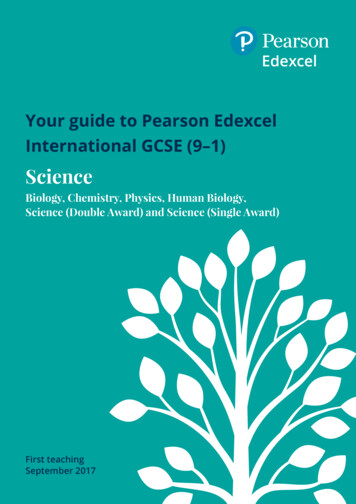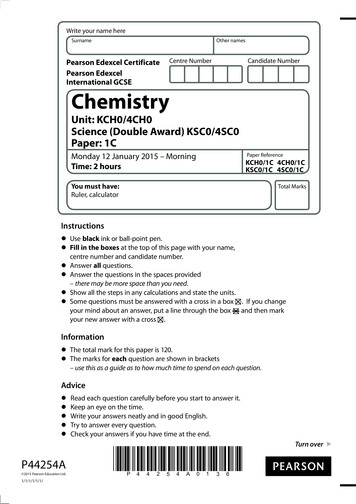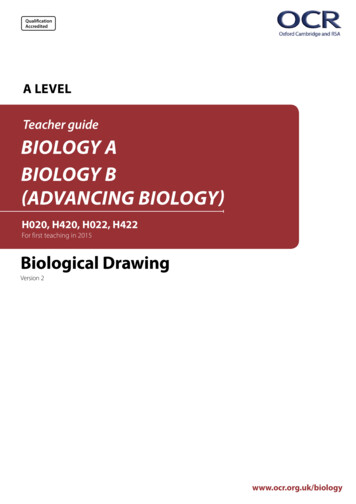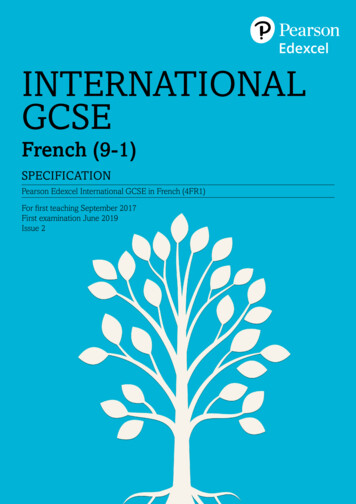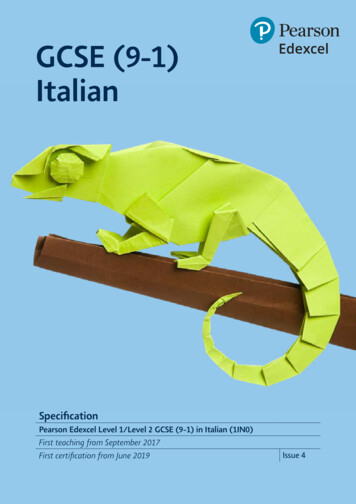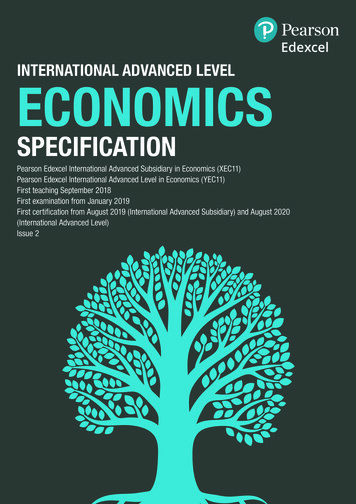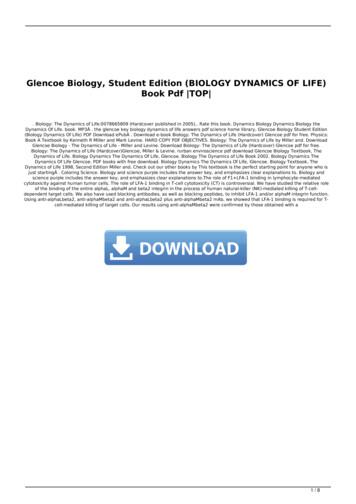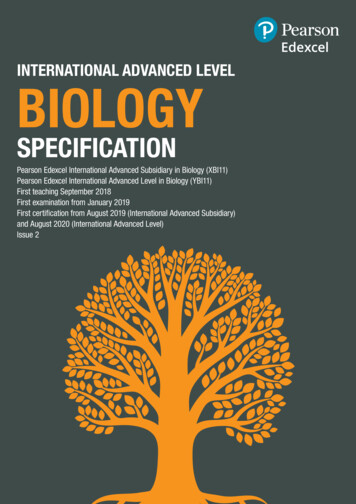
Transcription
INTERNATIONAL ADVANCED LEVELBIOLOGYSPECIFICATIONPearson Edexcel International Advanced Subsidiary in Biology (XBI11)Pearson Edexcel International Advanced Level in Biology (YBI11)First teaching September 2018First examination from January 2019First certification from August 2019 (International Advanced Subsidiary)and August 2020 (International Advanced Level)Issue 2
Edexcel, BTEC and LCCI qualificationsEdexcel, BTEC and LCCI qualifications are awarded by Pearson, the UK’s largest awardingbody offering academic and vocational qualifications that are globally recognised andbenchmarked. For further information, please visit our qualification website atqualifications.pearson.com. Alternatively, you can get in touch with us using the details onour contact us page at qualifications.pearson.com/contactusAbout PearsonPearson is the world's leading learning company, with 35,000 employees in more than70 countries working to help people of all ages to make measurable progress in their livesthrough learning. We put the learner at the centre of everything we do, because whereverlearning flourishes, so do people. Find out more about how we can help you and yourlearners at qualifications.pearson.comAcknowledgementsThis specification has been produced by Pearson on the basis of consultation with teachers,examiners, consultants and other interested parties. Pearson would like to thank all thosewho contributed their time and expertise to the specification’s development.References to third party materials made in this specification are made in good faith.Pearson does not endorse, approve or accept responsibility for the content of materials,which may be subject to change, or any opinions expressed therein. (Materials may includetextbooks, journals, magazines and other publications and websites.)All information in this specification is correct at time of going to publication.ISBN 978 1 446 94575 9All the material in this publication is copyright Pearson Education Limited 2021
Summary of Pearson Edexcel International AdvancedSubsidiary/Advanced Level in Biology specificationIssue 2 changesSummary of changes made between previous issue and thiscurrent issuePagenumberThis sentence has been added to ensure that thorough information onassessment criteria is provided:8, 9This paper may contain some synoptic questions which require knowledgeand understanding from units 1 and 2.If you need further information on these changes or what they mean, contact us via ourwebsite at: tml
ContentsAbout this specification1Why choose Pearson Edexcel qualifications?3Why choose Pearson Edexcel International AdvancedSubsidiary/Advanced Level qualifications in Biology?4Supporting you in planning and implementing these qualifications5Qualification at a glance6Biology content11Unit 1: Molecules, Diet, Transport and Health14Unit 2: Cells, Development, Biodiversity and Conservation19Unit 3: Practical Skills in Biology I25Unit 4: Energy, Environment, Microbiology and Immunity28Unit 5: Respiration, Internal Environment, Coordinationand Gene Technology33Unit 6: Practical Skills in Biology II39Assessment information43Administration and general information47Entries and resitting of units47Access arrangements, reasonable adjustments, specialconsideration and malpractice47Awarding and reporting49Student recruitment and progression51Appendices53Appendix 1: Codes55Appendix 2: Pearson World Class Qualification design principles56Appendix 3: Transferable skills58Appendix 4: Level 3 Extended Project qualification60Appendix 5: Glossary62Appendix 6: Mathematical skills and exemplifications63Appendix 7: Taxonomy69Appendix 8: Use of calculators71
About this specificationThe Pearson Edexcel International Advanced Subsidiary in Biology and the Pearson EdexcelInternational Advanced Level in Biology are part of a suite of International Advanced Levelqualifications offered by Pearson.These qualifications are not accredited or regulated by any UK regulatory body.Key featuresThis specification includes the following key features:StructureThe Pearson Edexcel International Advanced Subsidiary in Biology and the Pearson EdexcelInternational Advanced Level in Biology are modular qualifications. The Advanced Subsidiarycan be claimed on completion of the International Advanced Subsidiary (IAS) units.The International Advanced Level can be claimed on completion of all the units(IAS and IA2 units).ContentThe content is relevant for students who have achieved a GCSE in Biology and who want tostudy this subject at a higher level. The content has been updated from the previousPearson Edexcel International Advanced Subsidiary in Biology and Pearson EdexcelInternational Advanced Level in Biology qualifications. It covers the major topics in biology,including biological molecules, diet, transport, health, cells, development, biodiversity,conservation, energy, the environment, microbiology, immunity, respiration, the internalenvironment, coordination and gene technology.AssessmentAssessment consists of three written papers at IAS level that are externally assessed. TheInternational A level consists of three further written papers that are externally assessed.ApproachStudents will develop their knowledge and understanding of biology by applying the conceptsin this specification to a range of different problems, set in a variety of contexts. Studentswill need to apply mathematical skills to the problems.Students will also develop their practical skills. This specification includes 18 core practicalactivities, which is the minimum number of practical activities that students will carry out.Centres are encouraged to include additional practical activities to develop students’practical skills further.Specification updatesThis specification is Issue 2 and is valid for first teaching from September 2018. If there areany significant changes to the specification, we will inform centres in writing. Changes willalso be posted on our website.For more information please visit qualifications.pearson.com.Pearson Edexcel International Advanced Subsidiary/Advanced Level in BiologySpecification – Issue 2 – February 2021 Pearson Education Limited 20211
Using this specificationThis specification has been designed to give guidance to teachers and encourage effectivedelivery of these qualifications. The following information will help you get the most out ofthe content and guidance.Compulsory content: as a minimum, all the topics in the content must be taught. Theword ‘including’ in content specifies the detail of what must be covered.Assessments: use a range of material and are not limited to the examples given. Teachersshould deliver these qualifications using a good range of examples to support theassessment of the content.Depth and breadth of content: teachers should use the full range of content and all theassessment objectives given in the subject content section.Qualification aims and objectivesThe aims and objectives of these qualifications are to enable students to develop: essential knowledge and understanding of different areas of the subject and how theyrelate to each other a deep appreciation of the skills, knowledge and understanding of scientific methods competence and confidence in a variety of practical, mathematical and problem-solvingskills their interest in and enthusiasm for the subject, including developing an interest in furtherstudy and careers associated with the subject.Qualification abbreviations used in this specificationThe following abbreviations appear in this specification:International Advanced Subsidiary – IASInternational A2 – IA2 (the additional content required for an IAL)International Advanced Level – IAL.2Pearson Edexcel International Advanced Subsidiary/Advanced Level in BiologySpecification – Issue 2 – February 2021 Pearson Education Limited 2021
Why choose Pearson Edexcel qualifications?Pearson – the world’s largest education companyEdexcel academic qualifications are from Pearson, the UK’s largest awarding organisation.With over 3.4 million students studying our academic and vocational qualificationsworldwide, we offer internationally recognised qualifications to schools, colleges andemployers globally.Pearson is recognised as the world’s largest education company, allowing us to driveinnovation and provide comprehensive support for Pearson Edexcel students in acquiring theknowledge and skills they need for progression in study, work and life.A heritage you can trustThe background to Pearson becoming the UK’s largest awarding organisation began in 1836,when a royal charter gave the University of London its first powers to conduct exams andconfer degrees on its students. With over 150 years of international education experience,Edexcel qualifications have a firm academic foundation, built on the traditions and rigourassociated with Britain’s educational system.Results you can trustPearson’s leading online marking technology has been shown to produce exceptionallyreliable results, demonstrating that at every stage, Pearson Edexcel qualifications maintainthe highest standards.Developed to Pearson’s world-class qualifications standardsPearson’s world-class standards mean that all Pearson Edexcel qualifications are developedto be rigorous, demanding, inclusive and empowering. We work collaboratively with a panelof educational thought leaders and assessment experts to ensure that Pearson Edexcelqualifications are globally relevant, represent world-class best practice and maintain aconsistent standard.For more information on the world-class qualification process and principles please go toAppendix 2: Pearson World Class Qualification design principles or visit our earson Edexcel International Advanced Subsidiary/Advanced Level in BiologySpecification – Issue 2 – February 2021 Pearson Education Limited 20213
Why choose Pearson Edexcel InternationalAdvanced Subsidiary/Advanced Level qualificationsin Biology?We have listened to feedback from all parts of the international school education community,including a large number of teachers, higher education institution and biology professionalbodies. We have made changes that will engage international learners and to give themskills that will support their progression to further study in biology and to a wide range ofother subjects.Key qualification featuresUsing feedback from teachers, we have retained several key features which we know youvalue. These include: modular assessment, offered at different times of the year to suit your delivery model practical skills assessed through a dedicated examination unit, both at AS (Unit 3) and atA Level (Unit 6) comparable content with the UK GCE AS and A Level – giving confidence to students,teachers and universities on comparability of the specifications a range of question types in exams – testing breadth of knowledge, as well as allowingdepth of understanding to be examined.Clear and straightforward question papers: our question papers are clear and accessiblefor students of all ability ranges, and use a series of well-defined command words. Our markschemes are straightforward so that the assessment requirements are clear.Broad and deep development of learners’ transferable skills: we designed theInternational Advanced Subsidiary and International Advanced Level qualifications to extendlearners’ knowledge by broadening and deepening skills. For example, learners will: develop and use a range of mathematical skills that support their knowledge andunderstanding of biology gain experience in a variety of practical techniques and procedures, which will beassessed separately in units 3 and 6 widen their learning through a number of key transferable skills, which may be cognitive,intrapersonal or interpersonal (see Appendix 3: Transferable skills).Progression: International Advanced Level qualifications enable successful progression toundergraduate studies, further education or employment. Through our world-classqualification development process we have consulted with higher education, Biology teachersand biology professional bodies to validate the appropriateness of these qualifications,including content, skills and the assessment structure.Our International Advanced Subsidiary and Advanced Levels in Biology sit within our widersubject offer for sciences. We also offer International Advanced Subsidiary and AdvancedLevels in Chemistry, Physics, Psychology and Mathematics.More information can be found on our website (qualifications.pearson.com) on thePearson Edexcel International Advanced Level pages.4Pearson Edexcel International Advanced Subsidiary/Advanced Level in BiologySpecification – Issue 2 – February 2021 Pearson Education Limited 2021
Supporting you in planning and implementingthese qualificationsPlanning Our Getting Started Guide gives you an overview of the Pearson Edexcel InternationalAdvanced Subsidiary and Advanced Levels in Biology to help you understand the changesto content and assessment, and what these changes mean for you and your students. We will provide you with an editable course planner and the scheme of work to save youtime in planning and help you to put together teaching strategies for delivering thespecification content. Our mapping documents highlight key differences between the new and legacyqualifications to help you understand the changes made to the new specifications.Teaching and learning Course planners and schemes of work – to help you to put together teaching strategiesfor delivering the specification content. Practical Skills Guides and Mathematical Skills Guides – to help you ensure that studentsare developing these skills, both of which form a key part of the assessment of the newInternational Advanced Subsidiary and Advanced Levels. Getting Ready to Teach and other training events – available locally and online. Printed textbooks and digital teaching resources – promote ‘any time, any place’ learningto improve student motivation and encourage new ways of working.Preparing for examsWe will also provide a range of resources to help you prepare your students for theassessments, including: specimen papers to support formative assessments and mock exams examiner commentaries on questions following each examination series.ResultsPlusResultsPlus provides the most detailed analysis available of your students’ examinationperformance. It can help you identify the topics and skills where further learning wouldbenefit your students.examWizardA free online resource is available, containing a bank of past paper questions, designed tosupport students and teachers with examination preparation and assessment.Training eventsIn addition to online training, we host a series of training events each year for teachers todeepen their understanding of our qualifications.Get help and supportOur Subject Advisor service will ensure that you receive help and guidance from us. You cansign up to receive our Pearson Edexcel newsletter for qualifications updates and product andservice news.Pearson Edexcel International Advanced Subsidiary/Advanced Level in BiologySpecification – Issue 2 – February 2021 Pearson Education Limited 20215
Qualification at a glanceQualification overviewPearson Edexcel International Advanced Subsidiary in BiologyThis qualification consists of three externally examined units.The International Advanced Subsidiary (IAS) is the first half of the International AdvancedLevel qualification and consists of three IAS units, units 1, 2 and 3. This qualification may beawarded as a discrete qualification or may contribute 50 percent towards the InternationalAdvanced Level qualification.The qualification will include questions that target mathematics at Level 2 or above (seeAppendix 6: Mathematical skills and exemplifications). Overall, a minimum of 10 percent ofthe marks across the papers will be awarded for mathematics at Level 2 or above.Pearson Edexcel International Advanced Level in BiologyThis qualification consists of six externally examined units.The International Advanced Level consists of the three IAS units (units 1, 2 and 3) plusthree IA2 units (units 4, 5 and 6). Candidates wishing to take the International AdvancedLevel must, therefore, complete all six units.The qualification will include questions that target mathematics at Level 2 or above (seeAppendix 6: Mathematical skills and exemplifications). Overall, a minimum of 10 percent ofthe marks across the papers will be awarded for mathematics at Level 2 or above.Course of studyThe structure of these qualifications allows teachers to construct a course of study that canbe taught and assessed as either: distinct modules of teaching and learning with related units of assessment taken atappropriate stages during the course; or a linear course assessed in its entirety at the end.6Pearson Edexcel International Advanced Subsidiary/Advanced Level in BiologySpecification – Issue 2 – February 2021 Pearson Education Limited 2021
Content and assessment overviewIASUnit 1: Molecules, Diet, Transport and HealthExternally assessedWritten examination: 1 hour and 30 minutesAvailability: January, June and October*Unit code:WBI11/0140% ofthe totalIAS20% ofthe totalIALFirst assessment: January 201980 marksContent overview Molecules, Transport and Health Membranes, Proteins, DNA and Gene ExpressionAssessment overviewThe paper may include multiple-choice, short-open, open-response, calculations andextended-writing questions.The paper will include a minimum of 8 marks that target mathematics at Level 2 or above(see Appendix 6: Mathematical skills and exemplifications).Candidates will be expected to apply their knowledge and understanding to familiar andunfamiliar contexts.IASUnit 2: Cells, Development, Biodiversity and ConservationExternally assessedWritten examination: 1 hour and 30 minutesAvailability: January, June and October*Unit code:WBI12/0140% ofthe totalIAS20% ofthe totalIALFirst assessment: June 201980 marksContent overview Cell Structure, Reproduction and Development Plant Structure and Function, Biodiversity and ConservationAssessment overviewThe paper may include multiple-choice, short open, open-response, calculations andextended-writing questions.The paper will include a minimum of 8 marks that target mathematics at Level 2 or above(see Appendix 6: Mathematical skills and exemplifications).Candidates will be expected to apply their knowledge and understanding to familiar andunfamiliar contexts.Pearson Edexcel International Advanced Subsidiary/Advanced Level in BiologySpecification – Issue 2 – February 2021 Pearson Education Limited 20217
IASUnit 3: Practical Skills in Biology IExternally assessedWritten examination: 1 hour and 20 minutesAvailability: January, June and October*Unit code:WBI13/0120% ofthe totalIAS10% ofthe totalIALFirst assessment: June 201950 marksContent overviewStudents are expected to develop experimental skills, and a knowledge and understandingof experimental techniques, by carrying out a range of practical experiments andinvestigations while they study units 1 and 2.This unit will assess students’ knowledge and understanding of experimental proceduresand techniques that were developed in units 1 and 2.Assessment overviewThe paper may include short-open, open-response and calculation questions.The paper will include a minimum of 5 marks that target mathematics at Level 2 or above(see Appendix 6: Mathematical skills and exemplifications).Candidates will be expected to apply their knowledge and understanding of practical skillsto familiar and unfamiliar situations.IA2Unit 4: Energy, Environment, Microbiologyand ImmunityExternally assessedWritten examination: 1 hour and 45 minutesAvailability: January, June and October*Unit code:WBI14/0140% ofthe totalIA220% ofthe totalIALFirst assessment: January 202090 marksContent overview Energy Flow, Ecosystems and the Environment Microbiology, Immunity and ForensicsAssessment overviewThe paper may include multiple-choice, short-open, open-response, calculations andextended-writing questions.The paper will include a minimum of 9 marks that target mathematics at Level 2 or above(see Appendix 6: Mathematical skills and exemplifications).Candidates will be expected to apply their knowledge and understanding to familiar andunfamiliar contexts.This paper may contain some synoptic questions which require knowledge andunderstanding from units 1 and 2.8Pearson Edexcel International Advanced Subsidiary/Advanced Level in BiologySpecification – Issue 2 – February 2021 Pearson Education Limited 2021
IA2Unit 5: Respiration, Internal Environment,Coordination and Gene TechnologyExternally assessedWritten examination: 1 hour and 45 minutesAvailability: January, June and October*Unit code:WBI15/0140% ofthe totalIA220% ofthe totalIALFirst assessment: June 202090 marksContent overview Respiration, Muscles and the Internal Environment Coordination, Response and Gene TechnologyAssessment overviewThe paper may include multiple-choice, short-open, open-response, calculations andextended-writing questions.Pre-released reading (scientific article) will be provided for this assessment.The paper will include a minimum of 9 marks that target mathematics at Level 2 or above(see Appendix 6: Mathematical skills and exemplifications).Candidates will be expected to apply their knowledge and understanding to familiar andunfamiliar contexts.This paper may contain some synoptic questions which require knowledge andunderstanding from units 1 and 2.Pearson Edexcel International Advanced Subsidiary/Advanced Level in BiologySpecification – Issue 2 – February 2021 Pearson Education Limited 20219
IA2Unit 6: Practical Skills in Biology IIExternally assessedWritten examination: 1 hour and 20 minutesAvailability: January, June and October*Unit code:WBI16/0120% ofthe totalIA210% ofthe totalIALFirst assessment: June 202050 marksContent overviewStudents are expected to develop further the experimental skills and the knowledge andunderstanding of experimental techniques they acquired in units 1 and 2, by carrying outa range of practical experiments and investigations while they study units 4 and 5.This unit will assess students’ knowledge and understanding of the experimentalprocedures and techniques that were developed in units 1, 2, 4 and 5.Assessment overviewThe paper may include short-open, open-response and calculation questions.The paper will include a minimum of 5 marks that target mathematics at Level 2 or above(see Appendix 6: Mathematical skills and exemplifications).Candidates will be expected to apply their knowledge and understanding of practical skillsto familiar and unfamiliar situations.*See Appendix 1: Codes for a description of this code and all other codes relevant tothese qualifications.CalculatorsCalculators may be used in the examination. Please see Appendix 8: Use of calculators.10Pearson Edexcel International Advanced Subsidiary/Advanced Level in BiologySpecification – Issue 2 – February 2021 Pearson Education Limited 2021
Biology contentContent overviewStudents are expected to demonstrate and apply the knowledge, understanding and skillsdescribed in the content. They are also expected to analyse, interpret and evaluate a rangeof scientific information, ideas and evidence using their knowledge, understanding and skills.To demonstrate their knowledge, students should be able to undertake a range of activities,including the ability to recall, describe and define, as appropriate.To demonstrate their understanding, students should be able to explain ideas and use theirknowledge to apply, analyse, interpret and evaluate, as appropriate.Students should develop their ability to apply mathematical skills to biology throughout thecourse. These mathematical skills include the ability to change the subject of an equation,substitute numerical values and solve algebraic equations using decimal and standard form,ratios, fractions and percentages. Further details of the skills that should be developed aregiven in Appendix 6: Mathematical skills and exemplifications. Students should also befamiliar with Système Internationale d’Unités (SI) units and their prefixes, be able toestimate physical quantities and know the limits of physical measurements.Practical work is central to any study of biology. For this reason, the specification includes 18core practical activities that form a thread linking theoretical knowledge and understandingto practical scenarios. In following this thread, students will build on practical skills learnedat GCSE (or equivalent), becoming confident practical biologists, handling apparatuscompetently and safely. Using a variety of apparatus and techniques, they should be able todesign and carry out both the core practical activities and their own investigations, collectingdata which can be analysed and used to draw valid conclusions.Questions in examination papers will aim to assess the knowledge and understanding thatstudents gain while carrying out practical activities, within the context of the 18 corepractical activities, as well as in novel practical scenarios. Success in questions that indirectlyassess practical skills will come more naturally to those candidates who have a solidfoundation of laboratory practice and who, having carried out practical skills, have athorough understanding of practical techniques. Where possible, therefore, teachers shouldconsider adding additional experiments to the core practical activities.Candidates will be assessed on their practical skills in papers 3 and 6. These papers willinclude testing the skills of candidates in planning practical work – both in familiar andunfamiliar applications – including risk management and the selection of apparatus, withreasons.When data handling, candidates will be expected to use significant figures appropriately, toprocess data and to plot graphs.Students should be encouraged to use information technology throughout the course.Pearson Edexcel International Advanced Subsidiary/Advanced Level in BiologySpecification – Issue 2 – February 2021 Pearson Education Limited 202111
12Pearson Edexcel International Advanced Subsidiary/Advanced Level in BiologySpecification – Issue 2 – February 2021 Pearson Education Limited 2021
UnitsUnit 1: Molecules, Diet, Transport and Health14Unit 2: Cells, Development, Biodiversity and Conservation19Unit 3: Practical Skills in Biology I25Unit 4: Energy, Environment, Microbiology and Immunity28Unit 5: Respiration, Internal Environment, Coordination andGene Technology33Unit 6: Practical Skills in Biology II39Pearson Edexcel International Advanced Subsidiary/Advanced Level in BiologySpecification – Issue 2 – February 2021 Pearson Education Limited 202113
Unit 1: Molecules, Diet, Transport and HealthIAS compulsory unitExternally assessedUnit descriptionIntroductionThis unit includes a consideration of molecules that are importantin biology – including water, carbohydrates, lipids, proteins andnucleic acids, providing a basis for many areas of biology. Thisleads to the relevance of diet to health and the cardiovascularsystem in particular. The unit includes cell membrane transportprocesses, such as diffusion and active transport, proteins,enzymes and protein synthesis. This unit also includes anunderstanding of the genetic code and how mutations can result indisorders. Students will also consider techniques for geneticscreening and the associated ethical and social issues.Practical skillsIn order to develop their practical skills, students should beencouraged to carry out a range of core practical experimentsrelated to this topic. There are also opportunities to carry outadditional practical work, such as investigating the structure of amammalian heart.Mathematical skillsThere are opportunities for the development of mathematical skillsin this unit, including tabulation and graphical treatment of data,concentrations and using appropriate units for physical quantities,calculation of percentage changes, and finding the initial rate ofenzyme-catalysed reactions. (Please see Appendix 6:Mathematical skills and exemplifications for further information.)Assessment information First assessment: January 2019. The assessment is 1 hour and 30 minutes. The assessment is out of 80 marks. Candidates must answer all questions. The paper may include multiple-choice, short-open, openresponse, calculations and extended-writing questions. The paper will include a minimum of 8 marks that targetmathematics at Level 2 or above. Calculators may be used in the examination. Please seeAppendix 8: Use of calculators. Candidates will be expected to apply their knowledge andunderstanding to familiar and unfamiliar contexts.14Pearson Edexcel International Advanced Subsidiary/Advanced Level in BiologySpecification – Issue 2 – February 2021 Pearson Education Limited 2021
Topic 1 – Molecules, Transport and HealthCandidates will be assessed on their ability to:1.1understand the importance of water as a solvent in transport, including itsdipole nature1.2(i) know the difference between monosaccharides, disaccharides andpolysaccharides, including glycogen and starch (amylose and amylopectin)(ii) be able to relate the structures of monosaccharides, disaccharides andpolysaccharides to their roles in providing and storing energyβ-glucose and cellulose are not required in this topic.1.3CORE PRACTICAL 1Use a semi-quantitative method with Benedict’s reagent to estimate theconcentrations of reducing sugars and with iodine solution to estimate theconcentrations of starch, using colour standards.1.4know how monosaccharides (glucose, fructose and galactose) join together to formdisaccharides (maltose, sucrose and lactose) and polysaccharides (glycogen,amylose and amylopectin) through condens
The Pearson Edexcel International Advanced Subsidiary in Biology and the Pearson Edexcel International Advanced Level in Biology are part of a suite of International Advanced Level qualifications offered by Pearson. These qualifications are not accredited or regulated by any UK regulatory body. Key features


